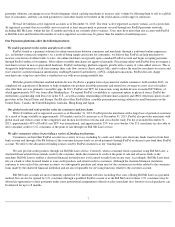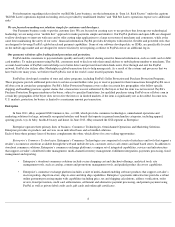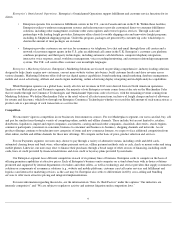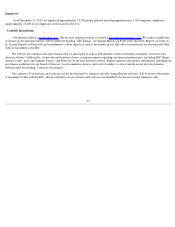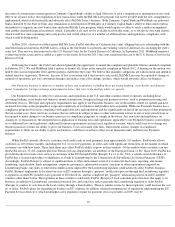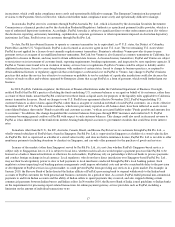eBay 2013 Annual Report Download - page 19
Download and view the complete annual report
Please find page 19 of the 2013 eBay annual report below. You can navigate through the pages in the report by either clicking on the pages listed below, or by using the keyword search tool below to find specific information within the annual report.
inconsistent, which could make compliance more costly and operationally difficult to manage. The European Commission has proposed
revisions to the Payments Services Directive, which could further make compliance more costly and operationally difficult to manage.
In Australia, PayPal serves its customers through PayPal Australia Pty. Ltd., which is licensed by the Australian Securities Investment
Commission as a financial product and by the Australian Prudential Regulatory Authority as a purchased payment facility provider, which is a
type of authorized depository institution. Accordingly, PayPal Australia is subject to significant fines or other enforcement action if it violates
the disclosure, reporting, anti-money laundering, capitalization, corporate governance or other requirements imposed on Australian depository
institutions. In China, PayPal serves its customers through PayPal Pte. Ltd.
To date, PayPal has obtained licenses to operate as a money transmitter (or its equivalent), in 47 U.S. states, the District of Columbia,
Puerto Rico and the U.S. Virgin Islands. PayPal is also licensed as an escrow agent in one U.S. state. The two remaining U.S. states where
PayPal has not applied for a license do not currently regulate money transmitters. Braintree's subsidiary Venmo provides its peer-to-peer
payment service as an agent of an unaffiliated money transmitter, PreCash, but Venmo is also licensed as a money transmitter in California, has
applied for a license in Hawaii, and may need to obtain additional state licenses. As licensed money transmitters, PayPal and Venmo are subject
to restrictions on its investment of customer funds, reporting requirements, bonding requirements, and inspection by state regulatory agencies. If
PayPal or Venmo were found to be in violation of money services laws or regulations, PayPal or Venmo could be subject to liability and/or
additional restrictions, forced to cease doing business with residents of certain states, forced to change its business practices, or required to
obtain additional licenses or regulatory approvals that could impose a substantial cost on PayPal or Venmo. Any change to PayPal's business
practices that makes the service less attractive to customers or prohibits its use by residents of a particular jurisdiction could also decrease the
velocity of trade on eBay and websites operated by Enterprise clients that accept PayPal as a form of payment, which would further harm our
business.
In 2012, PayPal's California regulator, the Division of Financial Institutions under the California Department of Business Oversight,
notified PayPal that PayPal's practice of holding the funds underlying U.S. customer balances as an agent on behalf of its customers, rather than
as owner of those funds, meant that PayPal could not treat those funds as liquid assets for purposes of the liquidity rules applicable to California
money transmitter licensees. Based on changes to our U.S. PayPal user agreement effective November 2012, PayPal began holding U.S.
customer balances as direct claims against PayPal, rather than as an agent or custodian on behalf of such PayPal customers. As a result, effective
November 2012, all U.S. PayPal customer balances, which were previously reported as off
-balance sheet, have been reflected as assets in our
consolidated balance sheet under "Funds receivable and customer accounts," with an associated liability under "Funds payable and amounts due
to customers." In addition, this change disqualified the customer balances from pass-through FDIC insurance and resulted in U.S. PayPal
customers becoming general creditors of PayPal with respect to such customer balances. This change could also result in decreased revenue to
PayPal as it has shifted some of the funds from interest-bearing bank deposit accounts to government securities that could bear lower interest
rates.
In markets other than the U.S., the EU, Australia, Canada, Brazil, and Russia, PayPal serves its customers through PayPal Pte. Ltd., a
wholly-owned subsidiary of PayPal that is based in Singapore. PayPal Pte. Ltd. is supervised in Singapore as a holder of a stored value facility.
As PayPal Pte. Ltd. is supervised as a holder of a stored value facility, and does not hold a remittance license, PayPal Pte. Ltd. is not able to offer
remittance payments (including donations to charities) in Singapore, and can only offer payments for the purchase of goods and services.
In many of the markets (other than Singapore) served by PayPal Pte. Ltd., it is not clear whether PayPal's Singapore-based service is
subject only to Singaporean law or, if it is subject to local laws, whether such local laws would require a payment processor like PayPal to be
licensed as a bank or financial institution or otherwise. In such markets, PayPal may rely on partnerships with local banks to process payments
and conduct foreign exchange in local currency. Local regulators, who do not have direct jurisdiction over Singapore-based PayPal Pte. Ltd.,
may use their local regulatory power to slow or halt payments to local merchants conducted through PayPal's local banking partner. Such
regulatory actions impacting local banking partner arrangements could impose substantial costs and involve considerable delay to the provision
or development of PayPal services in a given market, or could prevent PayPal from providing any services in a given market. For example, in
January 2010, the Reserve Bank of India directed the Indian affiliate of PayPal's processing bank to suspend withdrawals to the Indian bank
accounts of PayPal customers for both personal and business customers for a period of time. As a result, PayPal ended personal non-commercial
payments to and from Indian accounts and the ability of Indian sellers to spend payments they received, and also stopped offering certain
commercial payments between Indian buyers and Indian sellers. In November 2010, the Reserve Bank of India issued guidelines to Indian banks
on the requirements for processing export-related transactions for online payment gateway service providers such as PayPal, including a
limitation on the amount of individual transactions to no
17


